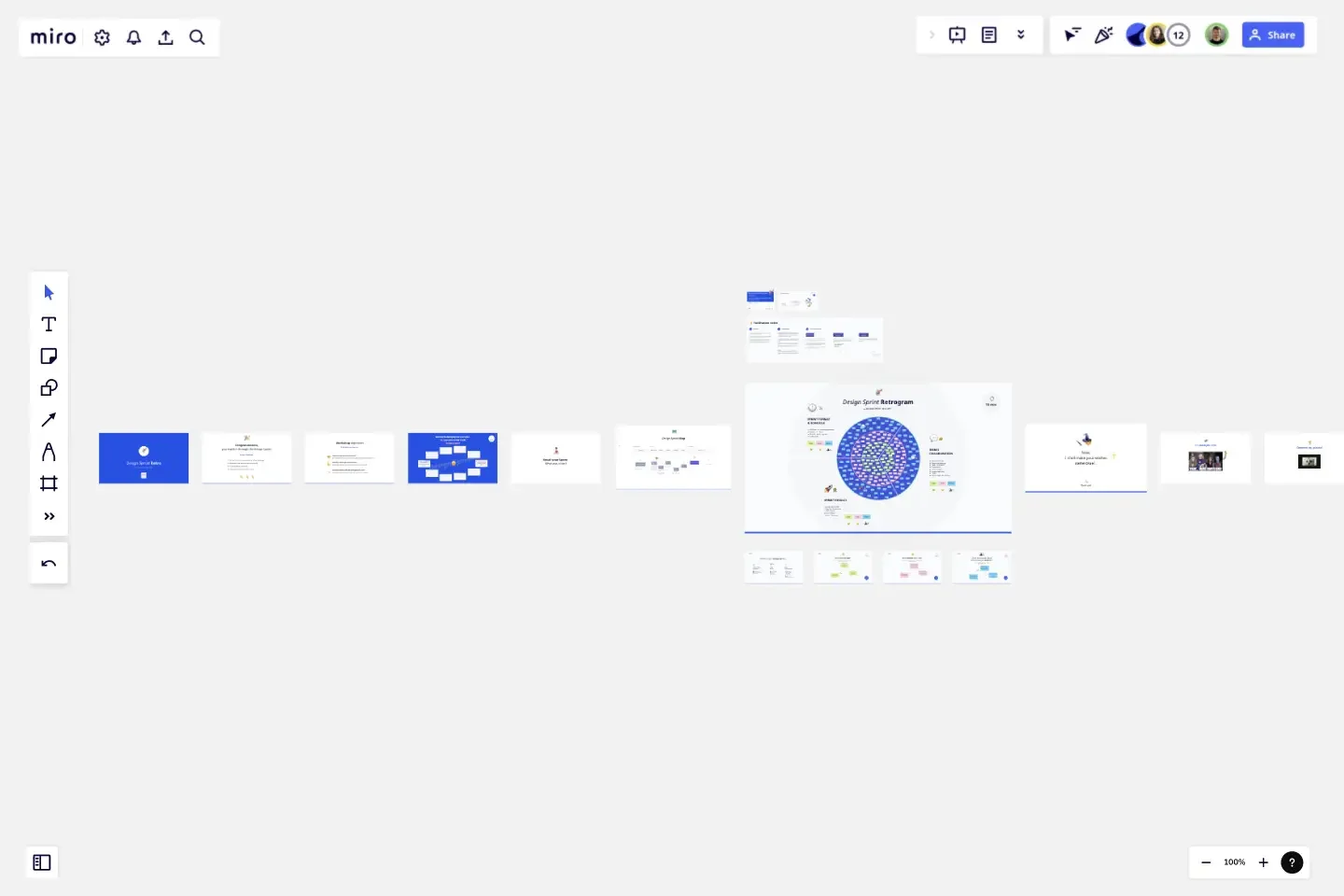Design Sprint Retrogram
A design sprint retrospective is a team meeting focused on improving the design sprint experience and the sprint results.
The design sprint retro (short for retrospective) occurs at the end of each Design Sprint and enables the team to reflect on their sprint experience and share their honest feedback on what went well, what were some challenges, and what should be done better next time.
With our Design Sprint Retrogram Template, facilitators can efficiently highlight opportunities for change and generate meaningful improvements on areas like:
Remote Design Sprint format and schedule (offline vs. online sessions, number of sprint days, daily plan, the team size and structure);
Team collaboration (communication, decision-making, team alignment, engagement, inclusivity, accountability, trust, psychological safety);
Design Sprint Results (the long-term goal, sprint questions, solution sketches, prototype, user testing).
Any Design Sprint Facilitator can use our template to wrap up their design sprints and optimize their next one.
Here's how the 1-hour workshop is structured:
Welcome & congratulate the team for their achievements
Short warm-up
Quick overview of the Design Sprint week
Design Sprint Retrogram overview
Three-step reflection: Highs, Lows, Whishes
Facilitation Notes: If this is your first time doing a design sprint retrospective, we've also included facilitation notes to help you navigate the board. We recommend deleting them before starting the actual workshop.
This template was created by Design Sprint Academy.
Get started with this template right now.
Start, Stop, Continue Template
Works best for:
Retrospectives, Meetings, Workshops
Giving and receiving feedback can be challenging and intimidating. It’s hard to look back over a quarter or even a week and parse a set of decisions into “positive” and “negative.” The Start Stop Continue framework was created to make it easier to reflect on your team’s recent experiences. The Start Stop Continue template encourages teams to look at specific actions they should start doing, stop doing, and continue doing. Together, collaborators agree on the most important steps to be more productive and successful.
Lean Inception Workshop
Works best for:
Agile, Lean Methodology
The Lean Inception Workshop streamlines project kickoff by aligning teams on goals, scope, and priorities. It leverages Lean principles to eliminate waste and maximize value, guiding exercises to define user personas, map user journeys, and prioritize features. By fostering cross-functional collaboration and customer-centric thinking, this template accelerates project initiation and ensures alignment between stakeholders, empowering teams to deliver customer value faster.
Breakout Group Template
Works best for:
Education, Team Meetings, Workshops
Breakout groups provide an excellent opportunity for teammates to have candid conversations and connect on a more intimate level than is possible during a broader meeting. When you’re in a large group setting, it can be difficult for people to feel safe or comfortable speaking up. In a smaller group, participants can feel safer sharing their ideas. Since the group is more intimate, teams are empowered to participate rather than observe.
Easter Egg Retrospective
Works best for:
Agile Methodology, Retrospectives, Meetings
The Easter Egg Retrospective template offers a themed approach to retrospectives, incorporating elements of the Easter holiday. It provides elements for reflecting on past iterations, hunting for hidden insights, and brainstorming improvements. This template enables teams to have fun while addressing serious topics, fostering creativity and collaboration. By promoting a playful yet productive atmosphere, the Easter Egg Retrospective empowers teams to uncover hidden gems, drive improvement, and strengthen team cohesion effectively.
Mad Sad Glad Retrospective
Works best for:
Brainstorming, Ideation
It's tempting to measure a sprint’s success solely by whether goals and timelines were met. But there’s another important success metric: emotions. And Mad Sad Glad is a popular, effective technique for teams to explore and share their emotions after a sprint. That allows you to highlight the positive, underline the concerns, and decide how to move forward as a team. This template makes it easy to conduct a Mad Sad Glad that helps you build trust, improve team morale, and increase engagement.
4Ps Retrospective
The 4Ps Retrospective template offers a structured framework for teams to reflect on past iterations or projects using the 4Ps model (Praise, Problems, Possibilities, and Plans). It provides elements for sharing positive feedback, identifying challenges, exploring opportunities, and setting action plans. This template enables teams to conduct retrospectives systematically, generate actionable insights, and drive continuous improvement. By promoting a balanced and comprehensive approach, the 4Ps Retrospective empowers teams to enhance collaboration, boost morale, and achieve their objectives effectively.
